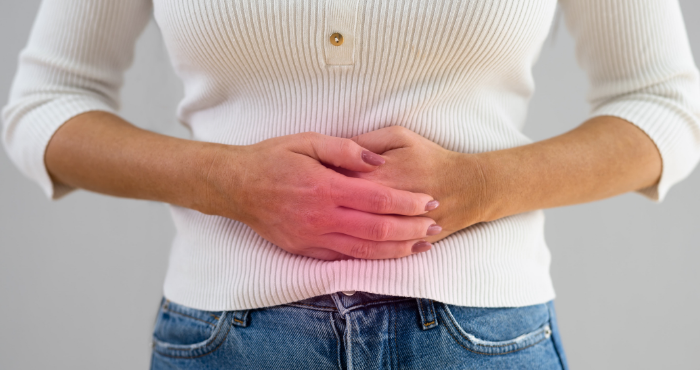
Reducing the Risk of Bowel Cancer through Lifestyle Change
Bowel cancer, also known as colorectal cancer, is the third most common cancer worldwide.1 The month of April marks Bowel Cancer Awareness month; a time dedicated to raising public awareness on how to reduce the risk of bowel cancer through lifestyle change. In this post, dietitian and graduate medical student, Sarah-Jane Reilly explores the evidence.
The Prevalence of Bowel Cancer
In the UK, bowel cancer accounts for 11% of all newly diagnosed cancer cases.2 Every 15 minutes, someone is diagnosed with bowel cancer, with the majority of cases presenting in the colon (71%) rather than the rectum (21%). 3,4 Bowel cancer is commonly described as a ‘Western lifestyle disease’ as the incidence of the disease is highest in developed countries such as New Zealand, Europe and North America.5
Common symptoms of bowel cancer include a persistent change in bowel habit, the presence of blood in stool, abdominal pain and discomfort or bloating brought on by eating.6 When identified early, the survival rate for bowel cancer is 90%, however, this figure drops to 13% for those diagnosed at a late stage. This highlights the importance of early diagnosis, recognition of the symptoms and primary prevention.1
Age and Genetic Predisposition in Determining Risk
The main non-modifiable risk factor for bowel cancer appears to be age. More than 90% of bowel cancer cases occur in individuals aged 50 years or older. 4 However, the incidence of bowel cancer in younger patients is on the rise.7 This is an important clinical consideration when working with Irritable Bowel Syndrome (IBS) patients as research indicates that younger patients, females and ethnic minority groups are at an increased risk of missed diagnosis for bowel cancer, with their symptoms often being attributed to constipation, stomach pains or isolated cases of anaemia.8 The majority of bowel cancer cases are sporadic but approximately 5-10% of cases are associated with recognised hereditary conditions.9
Lifestyle Factors that Increase Risk
Research suggests that 54% of bowel cancer cases are preventable.10 According to the World Cancer Research Fund, there is strong convincing evidence that consuming red or processed meat, consuming two or more alcoholic drinks per day and being overweight or obese increases the risk of developing bowel cancer. 11
Red and Processed Meat
According to a meta-analysis of 21 prospective studies, the long-term consumption of red and processed meat was associated with a 22% increased risk of bowel cancer (when contrasting the highest vs. lowest quartiles of intake),12 with increased frequency of red meat consumption being linked to a higher risk of carcinogenesis.13
Cooking meats at high temperatures promotes the formation of heterocyclic amines (HCAs) and polycyclic aromatic hydrocarbons (PAHs) which have been implicated in bowel carcinogenesis.11 Processed meats, such as sausages, are often cooked at higher temperatures which increases the risk of this exposure.
Similarly, haem iron present in red meat stimulates the endogenous formation of N-nitroso compounds which can promote colorectal tumorigenesis.11The International Agency for Research on Cancer (IARC) have concluded that processed meat is carcinogenic to humans with red meat being classed as ‘probably carcinogenic’.14
The World Cancer Research Fund advise eating no more than three portions of red meat per week (300-500g cooked meat) and to exclude processed meat from the diet.15 This carefully curated guidance balances the nutritional value of red meat against the potential risk of bowel cancer to provide a realistic recommendation.
Alcohol
Moderate alcohol drinkers (2-3 drinks per day) have a 21% increased risk of bowel cancer compared to non-drinkers, while heavy drinkers (4+ drinks per day) have a 52% increased bowel cancer risk.16 Low folate intake increases bowel cancer risk 2-5 fold.17 Of note, alcohol is known to reduce the absorption of folate in the diet.
In order to minimise the risks from drinking alcohol, the Chief Medical Officer recommends that no more than 14 units of alcohol (about 6 pints or 10 small glasses of wine) should be consumed per week for both men and women, with drink-free days encouraged each week.18
Overweight/Obesity
Another important modifiable risk factor for bowel cancer is obesity, with strong convincing evidence that being overweight or obese increases the risk of bowel cancer.1 Bowel cancer risk is 30% higher in men and 12% higher in women per 5-unit Body Mass Index (BMI) increase. 19 In the UK, a total of 11% of bowel cancer cases are linked to being overweight or obese.10 For most healthy adults, an ideal BMI is in the 18.5 to 24.9 range.
Lifestyle Factors that Decrease Risk
Physical Activity
The strongest evidence for reducing bowel cancer risk is linked to physical activity. Physical activity reduces body fatness and is thought to directly lower risk by reducing insulin resistance and inflammation.11The risk of developing bowel cancer is 19% lower in individuals with the highest rates of physical activity when compared to those with the lowest levels of activity.20
Dietary Fibre
The role of fibre in reducing bowel cancer risk has long been established. There is strong probable evidence that wholegrains and foods containing dietary fibre reduce the risk of bowel cancer.1
Dietary fibre is thought to reduce bowel cancer risk by increasing stool bulk, diluting carcinogens in the lumen of the colon and reducing stool transit time.11 A recent meta-analysis of 25 prospective studies found that there was a 10% reduction in bowel cancer risk per 10g/day of total dietary fibre consumed, with cereal fibre and wholegrains conferring the most benefit.21
In the UK, 28% of UK bowel cancer cases are thought to be caused by eating too little fibre.10 Data from the National Diet and Nutrition Survey supports this claim - in the most recent survey, mean intakes of fibre were below the recommended intake (30g/day) in all adult groups, with average intakes ranging from 15-21g/day. 22
Take Home Message
Although the relationship between genetics and environment is complex, research shows that the majority of bowel cancer cases can be prevented through lifestyle. Bowel cancer is often diagnosed at a late stage and dietitians should be aware of the potential for missed diagnoses, particularly when working with patients presenting with gastrointestinal disorders such as IBS.
In order to support the prevention of bowel cancer, dietitians should engage in the promotion of public health messages such as reducing intake of processed meat. They should also aim to highlight the importance of daily movement, increasing total fibre intake and maintaining a healthy body weight at each patient contact.
- ◄References:
-
- World Cancer Research Fund. Colorectal Cancer [Internet]. World Cancer Research Fund; 2021 [cited 2021 Mar 29]. Available from: https://www.wcrf.org/dietandcancer/colorectal-cancer
- Cancer Research UK. Bowel Cancer Statistics. [Internet]. Cancer Research UK; 2021 [cited 2021 Mar 29]. Available from: https://www.cancerresearchuk.org/health-professional/cancer-statistics/statistics-by-cancer-type/bowel-cancer#heading-Zero
- UK Department of Health and Social Care. Health matters: improving the prevention and diagnosis of bowel cancer [Internet]. London: Department of Health and Social Care; 2016 Jun 27 [cited 2021 Mar 29]. Available from: https://www.gov.uk/government/publications/health-matters-preventing-bowel-cancer/health-matters-improving-the-prevention-and-detection-of-bowel-cancer#how-to-improve-the-prevention-and-detection-of-bowel-cancer
- BMJ Best Practice. Colorectal Cancer. [Internet]. BMJ; 2021 [cited 2021 Mar 29]. Available from: https://bestpractice.bmj.com/topics/en-gb/258
- Jemal A, Bray F, Center M. et al. Global Cancer Statistics. CA. 2011 Feb 04; 61(2): 134-134.
- NHS. Symptoms Bowel Cancer [Internet]. NHS; 2021 [cited 2021 Mar 29]. Available from: https://www.nhs.uk/conditions/bowel-cancer/symptoms/
- Araghi M, Soerjomataram I, Bardot A et al. Changes in colorectal incidence in seven high-income countries: a population-based study. Lancet Gastroenterol Hepatol. 2019 Jul 04; 4(7): 511-518.
- Siminoff L, Rogers H, Harris-Haywood S. Missed Opportunities for the Diagnosis of Colorectal Cancer. BioMed Research International. 2015 April 25; 4: 1-9.
- Haggar F and Boushey R. Colorectal Cancer Epidemiology: Incidence, Mortality, Survival and Risk Factors. Clin Colon Rectal Sug. 2009 Nov 01; 22(4): 191-197.
- Brown K, Rumgay H, Dunlop C. et al. The fraction of cancer attributable to modifiable risk factors in England, Wales, Scotland, Northern Ireland, and the United Kingdom in 2015. Br J Cancer. 2018 Mar 23;118(8):1130-1141.
- World Cancer Research Fund/American Institute for Cancer Research. Diet, Nutrition, Physical Activity and Cancer: A Global Perspective. Continuous Update Project Expert Report 2018. Available at: dietandcancerreport.org
- Chan D, Lau R, Aune D. et al. Red and Processed Meat and Colorectal Cancer Incidence: Meta-analysis of Prospective Studies. PLoS One. 2011 Jun 06; 6(6). Doi: 10.137110.1371/journal.pone.0020456
- Smolinska K and Paluszkiewicz P. Risk of colorectal cancer in relation to frequency and total amount of red meat consumption. Systematic review and meta-analysis. Arch Med Sci. 2010 Aug 30; 6(4): 605-610.
- IARC. Red Meat and Processed Meat. [Internet]. Geneva: World Health Organisation; 2018 Mar 02 [Cited 2021 Mar 29]. Available from: https://publications.iarc.fr/Book-And-Report-Series/Iarc-Monographs-On-The-Identification-Of-Carcinogenic-Hazards-To-Humans/Red-Meat-And-Processed-Meat-2018
- World Cancer Research Fund/American Institute for Cancer Research. Continuous Update Project Expert Report 2018. Recommendations and public health and policy implications. Available at: dietandcancerreport.org
- Fedirko V, Tramacere I, Bagnardi V. et al. Alcohol drinking and colorectal cancer risk: an overall and dose-response meta-analysis of published studies. Ann Oncol. 2011 Feb 09; 22(9):1958-1972.
- Boffetta P and Hashibe M. Alcohol and Cancer. Lancet Oncology. 2006 Jan 30; 7(2): 149-156.
- Department of Health. UK Chief Medical Officers’ Alcohol Guidelines Review - Summary of the proposed new guidelines. London: Department of Health; 2016.
- Kyrgiou M, Kalliala I, Markozannes G. et al. Adiposity and cancer at major anatomical sites: umbrella review of the literature. BMJ. 2017 Feb 28; 356. doi:https://doi.org/10.1136/bmj.j477
- Machado de Rezende L, Herick de Sa T, Markozannes G. Physical activity and cancer: an umbrella review of the literature including 22 major anatomical sites and 770000 cancer cases. Br J Sports Med. 2017 Nov 16; 52(13): 826-833.
- Aune D, Chan D, Lau R. et al. Dietary fibre, whole grains, and risk of colorectal cancer: systematic review and dose-response meta-analysis of prospective studies. BMJ. 2011 Nov 10; 343. doi: https://doi.org/10.1136/bmj.d6617
- Public Health England. NDNS: time trend and income analyses from Years 1 to 9. [Internet]. London: Public Health England; 2019 Jan 23 [Cited 2021 Mar 29]. Available from: https://www.gov.uk/government/statistics/ndns-time-trend-and-income-analyses-for-years-1-to-9
















